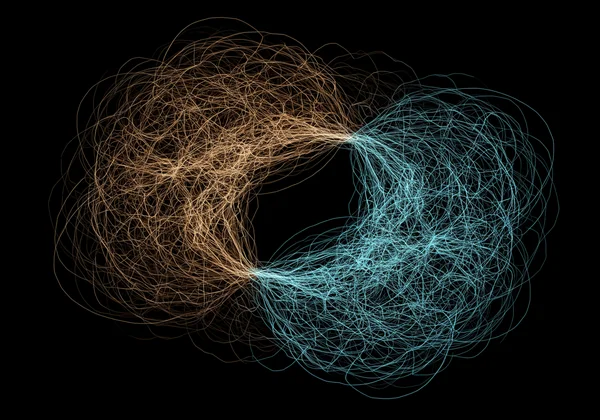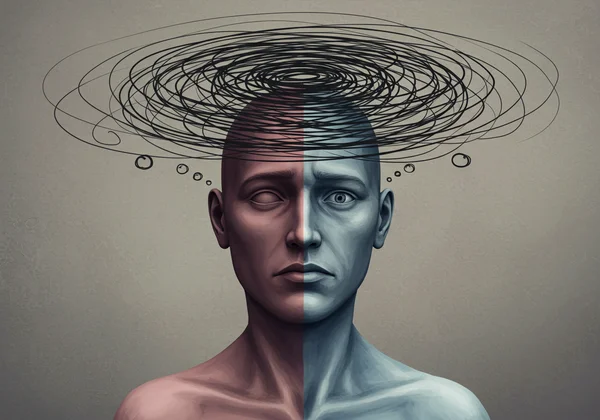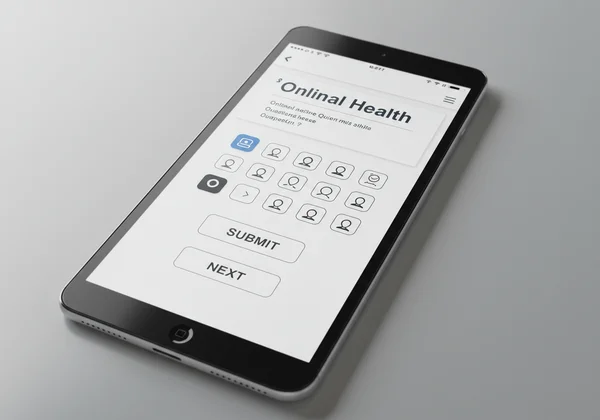Depression & Anxiety: Overlap, Symptoms & How a Test Helps
August 26, 2025 | By Liam Thornton
Feeling overwhelmed by a persistent low mood and a mind that won’t stop worrying? You are not alone. Many people experience the heavy weight of depression and the restless hum of anxiety at the same time, leading to a confusing and exhausting cycle. It can be difficult to tell where one ends and the other begins. This guide is here to help you understand the common overlap between these two conditions, learn to recognize their distinct and shared symptoms, and see how a preliminary depression and anxiety test can be a valuable first step toward gaining clarity. How do I check if I am depressed or anxious? It starts with understanding what you're feeling, and this confidential free screening tool can help illuminate the path.
Understanding the Overlap of Depression & Anxiety
It's incredibly common for depression and anxiety to occur together. The National Institute of Mental Health (NIMH) has noted that co-occurring anxiety disorders are frequently found in individuals with depression. Instead of viewing them as two separate issues, it’s often more helpful to see them as interconnected challenges that can influence and worsen each other. Understanding this connection is the first step toward managing your emotional well-being more effectively.

The Bidirectional Relationship: One Can Fuel the Other
The link between depression and anxiety is often described as bidirectional, meaning they can each trigger and reinforce the other. For instance, the constant worry and fear associated with anxiety can be draining, leaving you feeling hopeless and exhausted, which are hallmark symptoms of depression. Conversely, the lethargy and loss of interest from depression can make you withdraw from activities you once enjoyed, leading to social isolation and triggering anxiety about your relationships or future. This creates a challenging cycle where feeling anxious makes you depressed, and feeling depressed makes you anxious. Breaking this cycle starts with recognizing its existence.
Why Do Depression and Anxiety Often Occur Together?
There are several reasons why these two conditions, known as co-occurring disorders, frequently appear as a pair. They share many of the same biological and environmental risk factors. These can include:
- Brain Chemistry: Neurotransmitters like serotonin and dopamine, which regulate mood, are implicated in both depression and anxiety. An imbalance can contribute to the symptoms of either or both conditions.
- Genetics: A family history of either depression or anxiety can increase your susceptibility to developing one or both disorders.
- Stressful Life Events: Trauma, chronic stress, or significant life changes can trigger both anxious and depressive responses as your mind and body struggle to cope.
- Personality Traits: Certain temperaments, such as being prone to negative thinking or having low self-esteem, can make an individual more vulnerable to experiencing both conditions.
Common Symptoms of Depression and Anxiety
Untangling the symptoms of depression and anxiety can feel like trying to separate two intertwined threads. While they are distinct conditions, many of their signs overlap, which is why a comprehensive self-assessment can be so helpful. Learning the common signs of depression and anxiety gives you the language to describe what you're experiencing.
Emotional & Cognitive Signs to Look For
Your thoughts and feelings are the most immediate indicators of your mental state. Here are some of the key emotional and cognitive symptoms to be aware of:
-
Persistent Sadness or Emptiness: A low mood that lasts for weeks or longer is a core sign of depression.
-
Excessive Worry or Fear: A constant feeling of dread or being on edge about various aspects of life is characteristic of anxiety.
-
Loss of Interest (Anhedonia): A key sign of depression is no longer finding pleasure in hobbies, social activities, or things you used to love.
-
Irritability: Both conditions can shorten your fuse, leading to increased frustration and agitation.
-
Difficulty Concentrating: Trouble focusing, remembering things, or making decisions is a common cognitive symptom in both.
-
Feelings of Worthlessness or Guilt: Depression often brings a heavy sense of self-blame and hopelessness.

Physical Symptoms & Their Impact on Daily Life
Mental health is intrinsically linked to physical health. Often, the body is the first to signal that something is wrong. Many people are surprised to learn that their physical ailments could be tied to their emotional well-being.
- Fatigue and Low Energy: A profound sense of exhaustion that sleep doesn't fix is common in depression.
- Sleep Disturbances: This can manifest as insomnia (trouble falling or staying asleep), common in anxiety, or oversleeping (hypersomnia), often seen in depression.
- Changes in Appetite or Weight: Depression can lead to either a significant loss of appetite or emotional eating.
- Muscle Tension and Aches: Anxiety often causes the body to be in a constant state of tension, leading to headaches, a sore jaw, and other unexplained pains.
- Restlessness: Anxiety can make you feel fidgety and unable to sit still, as if you have pent-up nervous energy.
Key Differences Between Depression and Anxiety
Despite their significant overlap, there are core differences that help distinguish between depression and anxiety. Am I depressed or just sad? This is a question many people ask, and understanding these distinctions can provide much-needed clarity. Focusing on the core emotion and its impact on your energy can reveal important clues about your mental state.
Distinguishing Persistent Sadness from Constant Worry
The primary emotional tone is a key differentiator. Depression is often rooted in the past, characterized by feelings of sadness, hopelessness, and regret. You might ruminate on past failures or feel that your future is bleak because of them. The dominant feeling is a heavy, joyless emptiness.
Anxiety, on the other hand, is future-oriented. It is defined by worry, fear, and a sense of impending doom about things that haven't happened yet. You might find yourself caught in "what if" scenarios, catastrophizing about potential negative outcomes. The dominant feeling is one of tense, apprehensive dread.
Energy Levels and Motivation: A Key Indicator
Your energy and motivation levels also offer telling signs. Depression typically acts like a brake, slowing you down. It drains your motivation, making even simple tasks like getting out of bed feel monumental. You feel lethargic, heavy, and uninterested in engaging with the world.
In contrast, anxiety often acts like an accelerator stuck in the "on" position. It puts your body's fight-or-flight system on high alert, creating a feeling of restless, nervous energy. You might feel agitated, keyed up, and unable to relax, even when you're physically exhausted from the constant tension.

Why an Online Depression and Anxiety Test Can Help
Navigating these complex emotions on your own can be daunting. You may wonder if what you're feeling is "serious enough" to seek help. This is where a confidential and accessible online depression test can serve as a powerful tool for self-awareness and empowerment. It provides a private space to explore your feelings without judgment.

Getting Initial Clarity: What a Screening Provides
An online screening is not a diagnosis, but it is an invaluable first step. By answering a series of standardized questions based on recognized psychiatric screening tools, you can receive an objective summary of your symptoms. This provides immediate, preliminary feedback on your emotional state, helping you organize your thoughts and feelings into a clearer picture. This initial clarity can validate your experiences and empower you to take the next step. If you're ready to understand more, you can get initial clarity with a free assessment.
When to Seek Professional Guidance After Your Test
After completing a screening, you will have a better understanding of your emotional well-being. The results can serve as a helpful starting point for a conversation with a healthcare professional. It is essential to remember that tools like our online assessment are for informational purposes. A formal diagnosis can only be made by a qualified doctor, therapist, or psychiatrist who can conduct a comprehensive evaluation. Your results can help you articulate your concerns and ensure you get the most effective support.
Taking the First Step: Understanding Your Emotional Well-being
Understanding the intricate relationship between depression and anxiety is a crucial step toward managing your mental health. Recognizing that these conditions often coexist, learning their symptoms, and knowing their key differences empowers you to make sense of your experience. You don't have to navigate this confusion alone.
Taking a free, confidential screening test is a proactive and courageous first step toward self-discovery. It provides the clarity needed to move forward, whether that means implementing self-care strategies or seeking professional guidance. Ready to assess your emotional well-being? Start your free test today and take control of your mental health journey.
Frequently Asked Questions About Depression & Anxiety Tests
How do I know if I'm experiencing both depression and anxiety?
If you identify with symptoms from both categories—such as feeling both hopeless (depression) and constantly worried (anxiety), or experiencing both low energy (depression) and inner restlessness (anxiety)—you may be dealing with both. A structured screening can help identify the presence and severity of symptoms related to each condition.
Is it possible to have anxiety without depression, or vice versa?
Yes, absolutely. Many people experience only one of these conditions. It is entirely possible to have an anxiety disorder without depressive symptoms, or to experience a major depressive episode without significant anxiety. However, because they share underlying causes, the presence of one increases the risk for the other.
Can an online depression and anxiety test provide a diagnosis?
No, and this is a critical point. An online screening tool cannot provide a medical diagnosis. It is an educational resource designed to offer preliminary insights based on your self-reported symptoms. A formal diagnosis must be made by a qualified healthcare professional after a thorough evaluation. Think of it as a thermometer: it tells you if you have a fever, but a doctor tells you why.
What should I do after taking a depression and anxiety test?
Your results are a starting point. If they indicate mild symptoms, you might focus on self-care strategies like exercise, mindfulness, and healthy sleep habits. If your results suggest moderate to severe symptoms, it is strongly recommended that you share them with a doctor or mental health professional. You can use the summary from the depression screening test to help guide that conversation.